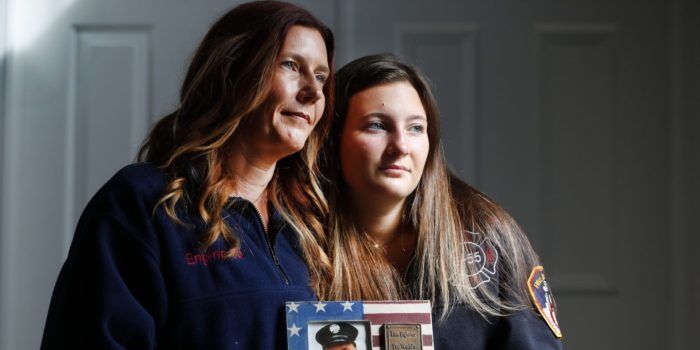(Headline USA) A poignant phrase echoes when 9/11 victims’ relatives gather each year to remember the loved ones they lost in the terror attacks.
“I never got to meet you.”
It is the sound of generational change at ground zero, where relatives read out victims’ names on every anniversary of the attacks. Nearly 3,000 people were killed when al-Qaida hijackers crashed four jetliners into the twin towers, the Pentagon and a field in southwest Pennsylvania on Sept. 11, 2001.
Some names are read out by children or young adults who were born after the strikes. Last year’s observance featured 28 such young people among more than 140 readers. Young people are expected again at this year’s ceremony Wednesday.
Some are the children of victims whose partners were pregnant. More of the young readers are victims’ nieces, nephews or grandchildren. They have inherited stories, photos and a sense of solemn responsibility.
Being a “9/11 family” reverberates through generations, and commemorating and understanding the Sept. 11 attacks one day will be up to a world with no first-hand memory of them.
“It’s like you’re passing the torch on,” says Allan Aldycki, 13.
He read the names of his grandfather and several other people the last two years, and plans to do so on on Wednesday. Aldycki keeps mementoes in his room from his grandfather Allan Tarasiewicz, a firefighter.
The teen told the audience last year that he’s heard so much about his grandfather that it feels like he knew him, “but still, I wish I had a chance to really know you,” he added.
Allan volunteered to be a reader because it makes him feel closer to his grandfather, and he hopes to have children who’ll participate.
“It’s an honor to be able to teach them because you can let them know their heritage and what to never forget,” he said by phone from central New York. He said he already finds himself teaching peers who know little or nothing about 9/11.
When it comes time for the ceremony, he looks up information about the lives of each person whose name he’s assigned to read.
“He reflects on everything and understands the importance of what it means to somebody,” his mother, Melissa Tarasiewicz, said.
Reciting the names of the dead is a tradition that extends beyond ground zero. War memorials honor fallen military members by speaking their names aloud. Some Jewish organizations host readings of Holocaust victims’ names on the international day of remembrance, Yom Hashoah.
The names of the 168 people killed in the 1995 bombing of a federal building in Oklahoma City are read annually at the memorial there.
On Sept. 11 anniversaries, the Pentagon’s ceremony includes military members or officials reading the names of the 184 people killed there. The Flight 93 National Memorial has victims’ relatives and friends read the list of the 40 passengers and crew members whose lives ended at the rural site near Shanksville, Pennsylvania.
The hourslong observance at the 9/11 Memorial in New York is almost exclusively dedicated to the names of the 2,977 victims at all three sites, plus the six people killed in the 1993 World Trade Center bombing. All are read by relatives who volunteer and are chosen by lottery.
Each is given a subset of names to render aloud. Readers also generally speak briefly about their own lost kin, frequently in touching detail.
“I think often about how, if you were still here, you would be one of my best friends, looking at colleges with me, getting me out of trouble with Mom and Dad, hanging out at the Jersey Shore,” Capri Yarosz said last year of her slain uncle, New York firefighter Christopher Michael Mozzillo.
Now 17, she grew up with a homemade baby book about him and a family that still mentions him in everyday conversation.
“Chris would have loved that” is a phrase often heard around the house.
She has read twice at the trade center ceremony.
“It means a lot to me that I can kind of keep alive my uncle’s name and just keep reading everybody else’s name, so that more of the upcoming generations will know,” she said by phone from her family’s home in central New Jersey. “I feel good that I can pass down the importance of what happened.”
Her two younger sisters also have read names, and one is preparing to do so again Wednesday. Their mother, Pamela Yarosz, has never been able to steel herself to sign up.
“I don’t have that strength. It’s too hard for me,” says Pamela Yarosz, who is Mozzillo’s sister. “They’re braver.”
By now, many of the children of 9/11 victims—such as Melissa Tarasiewicz, who was just out of high school when her father died—have long since grown up. But about 100 were born after the attacks killed one of their parents, and are now young adults.
“Though we never met, I am honored to carry your name and legacy with me. I thank you for giving me this life and family,” Manuel DaMota Jr. said of his father, a woodworker and project manager, during last year’s ceremony.
One young reader after another at the event commemorated aunts, uncles, great-uncles, grandfathers and grandmothers whom the children have missed throughout their lives.
“My whole life, my dad has said I reminded him of you.”
“I wish you got to take me fishing.”
“I wish I had more of you than just a picture on a frame.”
“Even though I never got to meet you, I will never forget you.”
Adapted from reporting by the Associated Press

